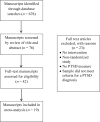Meditation and yoga for posttraumatic stress disorder: A meta-analytic review of randomized controlled trials
- PMID: 29100863
- PMCID: PMC5939561
- DOI: 10.1016/j.cpr.2017.10.004
Meditation and yoga for posttraumatic stress disorder: A meta-analytic review of randomized controlled trials
Abstract
Posttraumatic stress disorder (PTSD) is a chronic and debilitating disorder that affects the lives of 7-8% of adults in the U.S. Although several interventions demonstrate clinical effectiveness for treating PTSD, many patients continue to have residual symptoms and ask for a variety of treatment options. Complementary health approaches, such as meditation and yoga, hold promise for treating symptoms of PTSD. This meta-analysis evaluates the effect size (ES) of yoga and meditation on PTSD outcomes in adult patients. We also examined whether the intervention type, PTSD outcome measure, study population, sample size, or control condition moderated the effects of complementary approaches on PTSD outcomes. The studies included were 19 randomized control trials with data on 1173 participants. A random effects model yielded a statistically significant ES in the small to medium range (ES=-0.39, p<0.001, 95% CI [-0.57, -0.22]). There were no appreciable differences between intervention types, study population, outcome measures, or control condition. There was, however, a marginally significant higher ES for sample size≤30 (ES=-0.78, k=5). These findings suggest that meditation and yoga are promising complementary approaches in the treatment of PTSD among adults and warrant further study.
Keywords: Complementary health; Meditation; PTSD; Traumatic stress; Yoga.
Copyright © 2017 Elsevier Ltd. All rights reserved.
Figures



References
-
- American Psychiatric Association. Diagnostic and statistical manual of mental disorders. 5th. Washington, DC: Author; 2013.
-
- Baer RA. Mindfulness training as a clinical intervention: A conceptual and empirical review. Clinical Psychology: Science and Practice. 2003;10:125–143. doi: 10.1093/clipsy.bpg015. - DOI
-
- Borenstein M, Hedges LV, Higgins JPT, Rothstein HR. Introduction to Meta-Analysis. Chichester, U.K: John Wiley & Sons; 2009. - DOI
-
- Bormann JE, Thorp SR, Wetherell JL, Golshan S, Lang AJ. Meditation-based mantram intervention for veterans with posttraumatic stress disorder: A randomized trial. Psychological Trauma: Theory, Research, Practice, and Policy. 2013;5:259–267. doi: 10.1037/a0027522. - DOI
Publication types
MeSH terms
Grants and funding
LinkOut - more resources
Full Text Sources
Other Literature Sources
Medical

